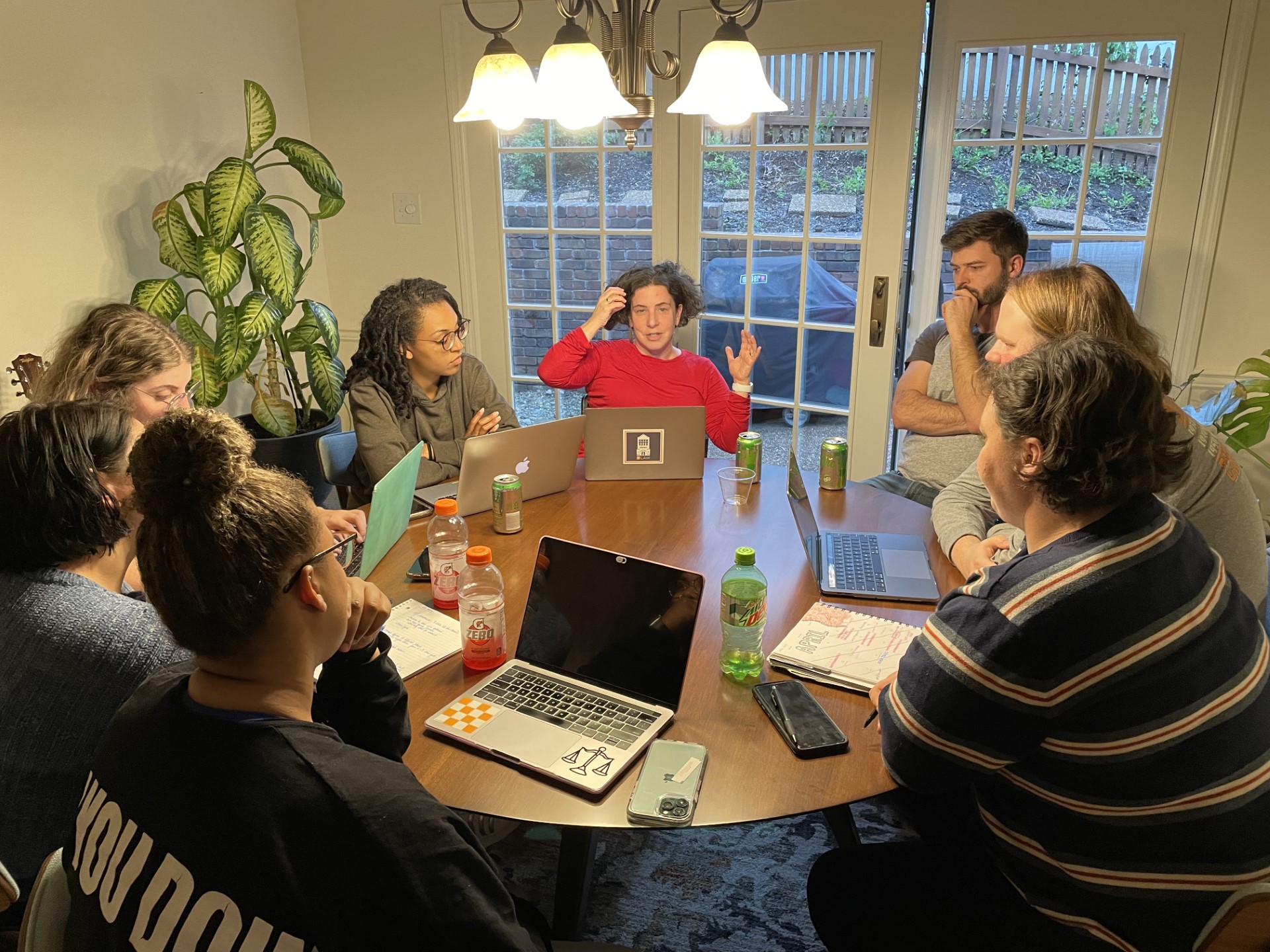Origins of the AJRC: A conversation with co-directors Wendy A. Bach and Michelle Brown

While 2024 marks the official launch of the Appalachian Justice Research Center (AJRC), a collaborative project of the College of Arts & Sciences and College of Law, the foundation of the AJRC is grounded in long-term efforts to build connections between law and social analysis as well as decades of experience doing just that between co-directors Professor Wendy A. Bach (Law) and Dr. Michelle Brown (Sociology).
Before entering the academy, Professor Bach was director of the Homelessness Outreach and Prevention Project at the Urban Justice Center in New York City and a staff attorney with Legal Aid Society of Brooklyn. Since 2005, Bach has taught and supervised in some of the leading clinical programs in the U.S.: she began her clinical teaching career at the City University of New York and since joining the UT College of Law in 2010 has taught primarily in Tennessee’s Advocacy Clinic. Over the years Bach held numerous leadership positions in clinical teaching including serving for six years on the editorial board of the Clinical Law Review and chairing the clinical section of the American Association of Law Schools in 2020. Today, Bach teaches and writes at the intersection of poverty law, criminal law, social welfare provision, law and society, and community lawyering. Her first book, Prosecuting Poverty, Criminalizing Care, was published by Cambridge University Press in 2022. Professor Bach also won the 2023 UTK Jefferson Prize and the 2016 Chancellor’s Award for Excellence in Teaching.
Dr. Brown is a criminologist and sociolegal scholar with a long history working in the field of law & society and critical criminology. She co-founded the Center for Law, Culture, and Justice at Ohio University before coming to UT. She then went on to serve as Undergraduate Director and Associate Head in her home department of Sociology at UT. From her first book The Culture of Punishment (NYUP, 2009) to numerous related editorial positions and additional volumes, Brown’s work focuses on the rise of the carceral state and attendant social movements directed at ending mass incarceration, building more effective forms of community safety, and shifting media narratives on crime and punishment. In 2016, she was named Critical Criminologist of the Year by the Division of Critical Criminology and Social Justice of the American Society of Criminology for her research and work in the community on justice issues. Brown is also the winner of the UTK Jefferson Prize, the Chancellor’s Award for Excellence in Teaching, the College of Arts & Sciences Diversity Award, the College of Arts & Sciences Senior Research Award, and the New Research in the Arts and Humanities Award.
With Brown’s deep experience in critical sociolegal research and Bach’s extensive background in clinical legal education, the pair began to vision and plan for a space where these models converged – and where the community, students, and faculty across disciplines are integral.
“Wendy and I had been doing this work for a while in community spaces, and we had been thinking about both our research and our pedagogy in those spaces,” said Brown. “We kept finding each other and other people from campus doing this work in the community, and we also saw a deep resonance with our students when they could access that kind of work. So out of that, we just started dreaming.”
Born out of ongoing community requests for support and collaboration, particularly the urgent need to re-envision community safety in the aftermath of the murders of George Floyd and Anthony Thompson Jr., Bach and Brown co-led a “Visions of Justice Practicum” course in Spring 2022. Students from across disciplines came together to conduct focus groups with young adults and parents impacted by violence and policing, to research best practices and to imagine models that would enhance the safety of communities and children. While the course itself was a powerful and productive space – which would lay the groundwork for the fall 2024 Appalachian Justice Research Lab – the lack of university infrastructure for a transdisciplinary course made everything from finding classroom space to scheduling to grading difficult.
“We were leading this course in our living rooms and hosting trainings and focus groups on Saturdays because we couldn’t find a course time,” said Bach. “It was fun, but there was no infrastructure for a course like this.” Brown added, “The fact that the students didn’t resist that impingement on their time, and instead, gravitated to it speaks to the power of the model.”
Bach and Brown were not alone in understanding the unique capacity of the university to meet the transdisciplinary research needs of communities in Central Appalachia: in the summer of 2022, faculty from Sociology, Law, Africana Studies, Geography, Social Work, and Psychology came together and applied for funding to build the kind of infrastructure that had been missing from the previous semester’s course. This collaboration initiated what is now the Appalachian Justice Research Center, which launched its website and social media properties in February 2024 and which will offer the inaugural course of the Appalachian Justice Research Lab in Fall 2024.
“There have been real structural barriers to leveraging the extraordinary research capacity on this campus towards community articulated needs,” said Bach. “If I spend the rest of my career trying to knock down those barriers and build infrastructure so that the community can access those resources, and so that the researchers and students on this campus have the privilege of doing this work, that works for me.”